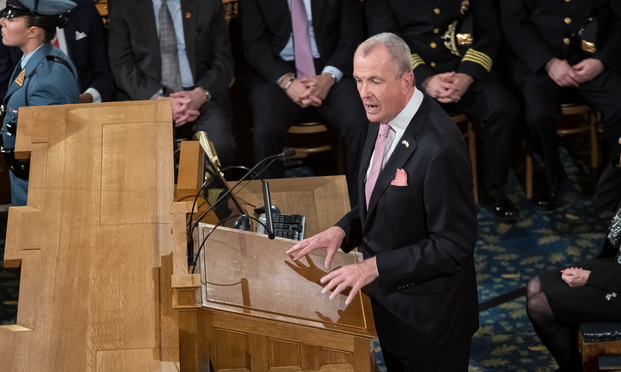With the novel coronavirus pandemic putting state government and the rest of daily life in at least partial paralysis, Gov. Phil Murphy and the Legislature will add three months to the fiscal year calendar to allow for reaching a balanced state budget, moving the deadline date from June 30 to Sept. 30.
Residents and businesses were also bought time to file income and corporate taxes, as that deadline moved from April 15 to July 15.
Murphy, Senate President Steve Sweeney, D-Gloucester, and Assembly Speaker Craig Coughlin, D-Middlesex, issued a joint statement on Wednesday on the extended timetable.
“The ongoing COVID-19 pandemic has caused hardships, financial strain, and disruptions for many New Jerseyans and New Jersey businesses. As part of our response, we have reached agreement that the state income tax filing deadline and the corporation business tax filing deadline will be extended from April 15th to July 15th,” the joint statement said.
“Additionally, as part of the whole-of-government effort that is going into fighting COVID-19, we have agreed that the state fiscal year should be extended to September 30th. This will allow the Administration and the Legislature to focus fully on leading New Jersey out of this crisis, and to allow for a robust, comprehensive, and well-informed budget process later in the year,” added the statement.
On March 16 and 19, the Assembly and Senate passed 28 bills that made up the COVID-19 emergency response package to aid residents, businesses, students, local governments, health practitioners, food banks, and others, in dealing with the pandemic’s fallout.
Murphy as of Wednesday had signed all but four of the 28 bills into law. The remaining four have to be revoted on by the Senate after recommendations by the governor were added. it remains to be determined whether money from the current fiscal year, federal stimulus, or next fiscal year, or a combination of all three, will help cover any COVID-related costs, according to legislative aides.
But Wednesday’s statement all but ceded the obvious: The probability of reaching the June 30 deadline to reach a balanced state budget as dictated by statute 52:5-1 was low due to extraordinary circumstances.
Department and agency heads—such as those representing the Department of Law and Public Safety, the New Jersey courts, and the Department of Corrections, among others—traditionally appear before budget committees in both chambers during March, April, May and June to plead their budget needs for the new fiscal year.
But the Statehouse in Trenton, like much of the country, has been in lockdown since mid-March. All committee hearings and voting sessions by the Assembly and Senate have been canceled at least through April 30, the same day to which President Donald Trump recently extended the nation’s self-quarantine and stay-indoors restrictions as the pandemic is yet to peak in several major U.S. cities.
Murphy declared a public health state of emergency in New Jersey on March 9 and moved swiftly toward “social distancing” measures to curtail the potentially deadly respiratory disease’s rapid spread by shutting down many businesses.
The only venues that have remained open are those deemed “essential” to maintaining people’s health and welfare during the pandemic, such as grocery stores, banks, gas stations and pharmacies.
On Monday, the governor added gun shops to the list of essential businesses that could stay open.
As of Sunday, April 5, the death toll in New Jersey from the COVID-19 pandemic had risen to 917, and there were 37,505 total cases throughout the state, second only to New York, which has emerged as the epicenter of the disease.
“We’re in the fight of our lives,” Murphy said at his daily coronavirus press briefing at the Trenton War Memorial on Wednesday. Of those lost, “we mourn each and every one of them.”
In addition to the grim reality of residents’ deaths, the severity of the pandemic’s toll on the state’s economy hasn’t been lost on Murphy.
Unemployment claims reportedly have skyrocketed in New Jersey and nationally due to mass layoffs brought on by the store closures, as well as businesses filing for bankruptcies or struggling to remain afloat with zero cash flow. The state’s coffers are significantly affected as income, sales and corporate business tax revenue make up a substantial portion of the state budget.
The tide turned in just over a month. During his annual budget address on Feb. 25, Murphy boasted how New Jersey had its lowest unemployment rate in 20 years (3.8%) and how business investment in the state was flourishing. “Today, wages are rising and more New Jerseyans are working than ever before,” Murphy said at that time. “Our unemployment rate is below 4% for the longest period of time than at any other point in the past 20 years. Our economy has supported the creation of more than 72,000 private-sector jobs, and, at the same time, we have kept our state workforce level.”
Monthly unemployment figures and workforce reductions for March will be released by the state Labor Department sometime this month.
NOT FOR REPRINT
© 2024 ALM Global, LLC, All Rights Reserved. Request academic re-use from www.copyright.com. All other uses, submit a request to [email protected]. For more information visit Asset & Logo Licensing.


 N.J. Gov. Phil Murphy delivers the State of the State address Jan. 14, 2020.
N.J. Gov. Phil Murphy delivers the State of the State address Jan. 14, 2020.






